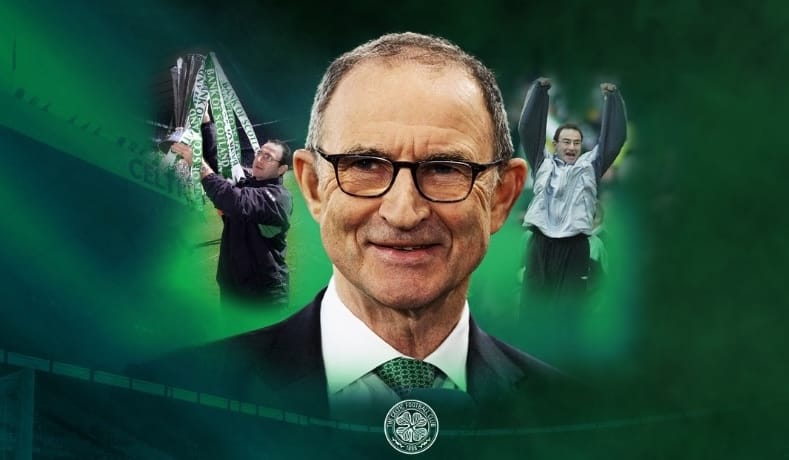
Martin O’Neill has confirmed that his return to Celtic is purely a short-term arrangement, insisting he is “only keeping the seat warm” until the club appoints a permanent manager.
The 73-year-old, who last managed in 2019, was approached following Brendan Rodgers’ dramatic resignation on Monday — a move that sent shockwaves through Scottish football and drew a fiery response from major shareholder Dermot Desmond.
A Call from the Past
Speaking to TalkSport, O’Neill admitted he was stunned to receive the call inviting him back to the club he led through one of its most successful modern eras.
"I took a gasp of breath and asked if this was real," he said. "It’s difficult to turn down someone who gave you the job in the first place when they had great options 25 years ago. By the time I pulled myself off the floor, I thought maybe I should do it."
O’Neill’s first match in charge will be at home to Falkirk on Wednesday night in the Scottish Premiership, as Celtic look to steady themselves after a turbulent few days.
Short-Term Mission
The Irishman was quick to play down expectations of a long-term return, emphasising his caretaker role.
"It’s short term. Celtic are probably stunned at the news Brendan left. They are obviously seeking a permanent manager, so it’s a short-term fit," he explained. "Interim does mean interim. It’s as simple as that. Celtic are looking for, I assume, a young coach with proven ability. We want to pull the club forward now."
O’Neill has appointed Shaun Maloney, a former Celtic player and Scotland international, as his assistant.
"Naturally, I had a super time at Celtic, it was a privilege," O’Neill added. "I can’t emphasise enough, it’s short term until a permanent manager is appointed. I’ll just keep the seat warm. I might just call Henrik Larsson and ask him if he’s been staying in the gym."
Rodgers’ Exit Sparks Fury
The fallout from Brendan Rodgers’ resignation has dominated headlines, with Dermot Desmond issuing an extraordinary open letter accusing the outgoing manager of being “divisive, misleading, and self-serving.”
In his statement, Desmond rejected Rodgers’ claim that he was denied control over transfers or the chance to extend his contract, insisting that the club had “consistently backed him” throughout his tenure.
"In reality, he was given final say over all football matters and was consistently backed in the recruitment process, including record investment in players he personally identified and approved," Desmond wrote.
"Regrettably, his words and actions since then have been divisive, misleading, and self-serving. They have contributed to a toxic atmosphere around the club and fuelled hostility towards members of the executive team and the board."
"What has failed recently was not due to our structure or model but to one individual’s desire for self-preservation at the expense of others."
Rodgers has yet to respond publicly to the accusations.
A Club in Transition
Celtic’s recent form has been troubling. The reigning champions sit eight points behind early league leaders Heart of Midlothian following Sunday’s 3-1 defeat at Tynecastle. Their European campaign has also disappointed, with the side failing to make an impact on the continental stage.
The club’s summer transfer activity has come under scrutiny, with many supporters believing the squad lacks the strength and creativity to compete at previous levels.
O’Neill, who guided Celtic to three Scottish Premiership titles, three Scottish Cups, one League Cup, and the 2003 UEFA Cup Final, returns as a reassuring figure at a moment of instability. For many fans, his name evokes a golden era of success and togetherness — something the club sorely needs to rediscover.
A Familiar Face to Reignite Belief
While O’Neill insists he is not the long-term solution, his presence could help steady the dressing room and rally a disillusioned fanbase. His deep connection to Celtic — and his understanding of what the club represents — may prove vital in the short term.
"It’s about giving the players confidence and reconnecting with supporters," a club insider told local media. "Martin understands Celtic in a way very few do. Even if he’s only here for a short spell, he can bring back a bit of pride and calm things down."
As speculation grows over who might take over permanently — with names like Ange Postecoglou, David Moyes, and Steve Clarke being floated — O’Neill’s immediate task is clear: stabilise the squad and bring some dignity back to the pitch.
What Next for Celtic?
With a crucial run of fixtures approaching and the league leaders beginning to pull away, Celtic’s hierarchy must move swiftly to identify a long-term successor. The next manager will inherit a talented yet unsettled squad and a fanbase demanding clarity and ambition.
For now, though, the club turns once again to a familiar face — a man who embodies Celtic’s spirit, history, and resilience.
Whether this brief reunion leads to revival or simply buys time, one thing is certain: Martin O’Neill’s return has reignited the passion and debate at the heart of Celtic Park.


